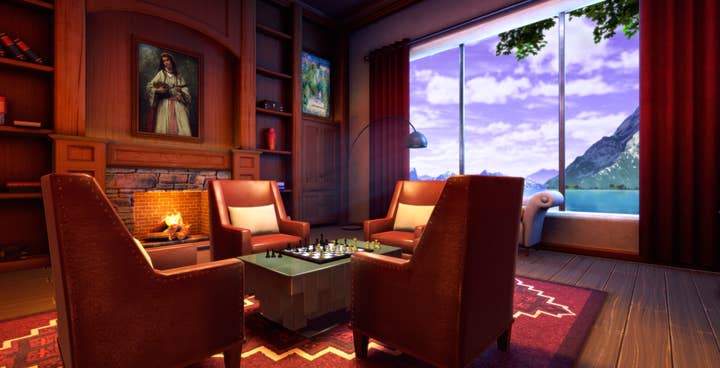Zynga, EEDAR vets launch VR studio focused on tabletop games
Experiment 7 wants to make tabletop and board games “better than life,” will publish other developers' titles on its Magic Table platform
EEDAR co-founder Geoffrey Zatkin and former Zynga New York GM Demetri Detsaridis have revealed their new virtual reality studio, Experiment 7, to GamesIndustry.biz. Joining Zatkin (Creative Director) and Detsaridis (GM) is Coray Seifert, the studio's director of production who previously served as executive producer at Impeller Studios. Unlike a lot of VR studios who have focused on shooting or action, Experiment 7 is hoping to transform game night, to make it possible to play any number of tabletop games with anyone in the world, but with a real social presence.
"Want to play a game of chess with your buddy who moved cross country? How about hanging in a starship lounge, gazing out at the stars and chatting just like you would in person? We're removing the geographical and logistical constraints that keep in-person game nights from happening, while maintaining the social aspects that make them fun with our Magic Table platform," says Zatkin.
Detsaridis adds, "We built Magic Table as a platform for our own games, but eventually want other developers to be able to release Magic Table games as well. Players on the platform can challenge real-world friends, other VR users from around the world, or face our custom AI opponents in a variety of tabletop games set in stunning and personalizable rooms. You can even play and chat with users on completely different VR hardware."
Magic Table Chess is already available, completely free, on Oculus Rift and Gear VR, and it makes you feel like you're sitting in a rich man's study; there's art on the walls, a serene waterfront view out the window, and peaceful music playing in the background. The table itself features a standard chess board, but it's easy to imagine all sorts of traditional board or collectible card games. The likes of D&D being played with others in virtual space certainly seems feasible, for example. Experiment 7 isn't announcing anything just yet, but the company is getting ready to announce some key licensing partnerships as well as "original titles designed by legendary creators."

For Experiment 7, social VR is a big opportunity. Much like Ubisoft Red Storm has espoused the virtues of social interaction in virtual space with titles like Werewolves Within, Zatkin sees VR's "killer app" as social presence.
"If I had to make an analogy, the difference between a 'looking at a screen' experience and a VR experience is the difference between talking to my wife on Skype versus talking to her across a coffee table. Presence is something that in-person games have, and that most traditional video games don't," he says
"I've also always enjoyed the communal aspect of games, and how they bring people together. For thousands of years, with a few exceptions, like Solitaire, games were things that people played socially. Video games, while adding richly to the menu of game types and experiences, have not always been able to cater to this social aspect of game playing. Some of my best game playing memories involve slotting quarters into Street Fighter II machines, the group improv nature of dungeon mastering, watching an opponent's expressions in Magic: The Gathering, and shaking hands after a Warhammer 40k match.
"Geographically, I'll never be able to get all my high school or college buddies back together for a game night. But with VR's sense of presence combined with its capacity to bring games to life in magical new ways we can start to get at something even better"
Geoffrey Zatkin
"Geographically, I'll never be able to get all my high school or college buddies back together for a game night. But with VR's sense of presence combined with its capacity to bring games to life in magical new ways (haven't you always wanted to play something like Star Wars' holographic chess?), we can start to get at something even better."
Developers in the AAA VR space have told me in the past that simple titles like chess don't really take advantage of the medium. Similarly, John Carmack has highlighted that too many game makers in VR are simply "coasting on novelty" without really innovating. Zatkin, of course, does not agree that chess doesn't belong in virtual space.
"'Coasting on novelty' happens with every new technology format while people figure out what works and what doesn't. But I couldn't disagree more that VR isn't built for games like chess. VR is a brand-new digital entertainment medium, and at Experiment 7, we're using it to bridge the gap between social presence and video game play experience. In our opinion, one of the things VR was made for is communal play experiences," he continues.
"But it isn't just chess-what we're going after is bigger. We're making a series of beautiful environments where you can meet up with your friends from around the world. In the middle of each of these environments is a 'Magic Table' that can spawn any number of games that are played on tables... The overall concept is simple: Join your friends in beautiful virtual settings, select a game to play, watch the game materialize on the Magic Table, and play it together.This is exactly what VR was made for."
Experiment 7, which has offices in New York and San Diego, got its name for being the seventh big project that Zatkin and Detsaridis have worked on. The company has major financial backing from Presence Capital, Gree, Colopl VR Fund, and Words With Friends co-creator David Bettner. A lot of other studios working in VR aren't in that position. And indeed, more and more developers are lamenting how hard it is to make any profit in VR when the barriers to entry for consumers remain high and the installed bases low.
"It's a healthy ecosystem, but it's not at the scale of PC, mobile or console yet. That's the best and worst part of a blue ocean though right? If profit was easy and the barrier to entry was low, every developer would be there and it would be like the mobile market, where there are so many great games launching every day that it's nearly impossible to get your game noticed," Seifert notes.
"We're looking at the long-term health of the VR market, which is really fantastic. Hardware costs are falling dramatically, the offerings are getting better every month, and there is some spectacular technology on the horizon.
"We have a saying internally when we run into some of the entertainingly unique challenges of developing for brand new hardware: 'If it were easy, it wouldn't be defensible.' We love working in this space and all the challenges along the way make for a great story, a great adventure and ultimately a great business model."
On the whole, Experiment 7 remains confident in the long-term viability of VR and its own market prospects.

"It's important to realize that VR isn't made exclusively for gaming, in the same way that computers, televisions, phones and web browsers aren't designed solely for gaming," Zatkin adds. "Gaming is an important aspect of each of these, but as part of an ecosystem of digital entertainment. Even gaming consoles, which are really just personal computers optimized for gaming, offer a wide variety of non-game related content. Historically, it's hard to motivate mass market, non-early adopter, consumers to buy new mono-purposed hardware. They need a breadth of compelling reasons to reach the tipping point of adoption; or, like with smartphones, to have a ubiquitous piece of hardware which can be co-opted for gaming purposes.
"This is our first generation of consumer-grade VR, and we're in Year 1. Even as someone who's been here a few times, it's easy to forget how challenging these first couple of years are. But working with cutting edge technology is always like this. Low install bases mean less people to sell to, which means not much money. But this is the market we knew was coming. Even when pie-in-the-sky predictions about VR were coming out, we've always been very specific with our team and our investors that this is a marathon not a 50-yard dash."
While 2016 failed to live up to the "Year of VR" moniker, Zatkin sees 2017 as the "second leg of the race" when real leaders emerge.
"One key to remember is that every day, more and more devices are being made that can provide great VR experiences: PCs, game consoles, even phones. Right now, fairly few people have them because they're the tops of all of their lines and they cost a lot, but as consumers replace their older gear, they're going to wind up with VR capabilities by default...and just like with CD-ROMs way back in the 90s, once they've got it, they're going to want to know what it can do. 2017 is the beginning of that process," he continues, "and getting in at the beginning ensures that we're ready with a rich portfolio of amazing games by the time the market really takes off. That means starting now."
Having come from Zynga, Detsaridis understands some of the negative connotations with free-to-play. With their chess title, Experiment 7 wanted to not only test its technology but gain players' trust. "Because we didn't have any licensing fees associated with Magic Table Chess and because, in many ways, it's also a test bed for our company and our technology, we felt it was much more important to just get the game into people's hands and see what they liked and how we could improve rather than to limit the number of players who would see it by making it a premium title," he explains.
"Other games we have in the pipeline are being created in partnership with some of the biggest companies in tabletop gaming, and those titles-whose names you'll be very familiar with-are more likely to be paid downloads.

"To be clear though, one thing we're not contemplating is the old fashioned social network games model of having to send people invites or buy gold to play for more than 10 minutes a day. Game design has come a long way since then and we're really determined that when we say that it's free to play Magic Table Chess or one of our other games, that we've thought through how to make that both a great experience for our players and a sustainable business."
With backgrounds from Zynga and EEDAR, Experiment 7 undoubtedly will look to leverage analytics, which is something that's not been talked about with VR titles as much at this nascent stage. Detsaridis wants to ensure that data is leveraged the right way, however.
"One thing I've always advocated for is that data can be an amazing input to any game's design, particularly multiplayer games. Data is the language your players speak back to you when you speak to them with design...and data analysis is the process of translating that language into something you can use to better your design," he says.
"We want to keep building on this foundation at Experiment 7. And both of our backgrounds with analytics have taught us some really useful techniques and methods with which we can try new things and see how players like them, without spending crazy amounts of time.
"The thing I think is most helpful about my and Geoffrey's experience with game data, is that having worked with it for years, we know both how to look for answers in the numbers and what types of answers numbers can give you. Like I was saying about free-to-play games a few minutes ago, I'm very grateful that the industry is past that initial period of infatuation during which you'd sometimes hear things like 'we don't need game design, we have real-time data'...which always sounded to me like 'we don't need architecture, we've got steel.' You need both to make skyscrapers and they do different things."
"Tremendous manufacturing capacity and comparatively lower costs probably mean that the mobile-based VR tech is going to be a lot easier to come by, certainly at first, but one thing we're definitely confident of is that once you've tried VR, you want more"
Demetri Detsaridis
While motion sickness is highly unlikely to be a problem for players of Magic Table, Detsaridis did use the phenomenon as an example of how important analytics can be in VR.
"There's an awesome new toolbox that opens when it's not just a little slice of screen in front of your player that you're learning about, but their entire environment... think about how vital collecting data will be to making sure your players won't get nauseous: how long did the session last before the player stopped turning her head? Did they look straight down and then take the headset off? How different was their behavior when we made the cockpit a bigger or smaller part of what they see?
"Game data has become an incredibly important and exciting part of the design process and I definitely see that continuing as we move deeper into the VR era," he says.
While Experiment 7 is targeting Rift and Gear VR initially, the company is certainly open to Vive, PSVR and other mobile platforms like Google Daydream. In fact, thanks to the Magic Table design not requiring room-scale and the very best GPU, the mobile opportunity may ultimately prove to be the greater one.
"Because we're building games that focus on multiplayer dynamics and social interaction, you're absolutely right that we're not only targeting multiple platforms, but making sure that whenever it's possible, players on one system can face off against friends and competitors on any other. As you said, not everyone has a VR headset right now, so whenever we can break down barriers between people playing together, that's going to be important to us," Detsaridis says.
"As far as mobile, desktop PC or console VR goes-because of the kind of games we're making (which don't involve a lot of real-world movement and, in in many cases, are best played while sitting)-we've been thinking of the hardware more in terms of its VR specs than in terms of what it does when it's not playing VR games. Ultimately, we think that some people want VR gaming as soon and easily as they can get it, others want incredible VR hot rods, and still others are going to want awesome new ways to play with the consoles they already own.
"Tremendous manufacturing capacity and comparatively lower costs probably mean that the mobile-based VR tech is going to be a lot easier to come by, certainly at first, but one thing we're definitely confident of is that once you've tried VR, you want more," he continues.
"It reminds me of the dawn of the personal computer era. It's not as if you either want a computer for your desk, or one that plugs into your TV and plays games, or one that's got a battery that you can keep on your lap-there are reasons to want all of them. And computers are everywhere now. With VR, we think there's going to be a big market for each of these paradigms...and probably a few more that don't exist yet, too."
